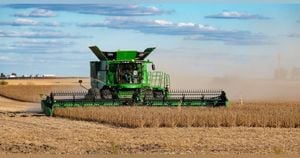In the world of climate science, we often focus on the big players: carbon emissions from cars, factories, and deforestation. However, a new groundbreaking study has shifted the spotlight onto one of the smallest yet incredibly influential contributors—microbes in the soil. Yes, those tiny organisms that are barely visible to the naked eye are playing a pivotal role in the complex dance of our planet’s carbon cycles and climate patterns.
The research, which delves deep into the hidden world beneath our feet, uncovers how microbial communities in the soil are not just passive participants but dynamic players affecting the carbon balance. The implications of these findings are vast, offering new insights into how we might mitigate climate change in the future.
What Lies Beneath: The Microbial World
To truly appreciate the significance of this study, it’s essential to understand the role microbes play in the soil. Microbes, including bacteria, fungi, and archaea, are responsible for breaking down organic matter, such as plant and animal remnants, and turning them into nutrients that plants can absorb. This process, known as decomposition, is a critical component of the carbon cycle.
However, microbes do more than just decompose. They engage in a range of biochemical processes that can either release carbon dioxide (CO2) into the atmosphere or store it in the soil. The balance between these processes plays a significant role in determining the amount of CO2 in the atmosphere, thereby influencing climate change.
Digging Deeper: The Study's Methodology
Conducted by a team of researchers from various institutions, this study utilized advanced techniques to explore the microbial communities in different soil types. They employed methods such as metagenomics, which involves sequencing the genetic material of all the organisms present in a sample, and stable isotope probing, a technique that helps trace the flow of nutrients through microbial communities.
“By using metagenomic sequencing, we were able to identify the diverse range of microbial communities present in the soil and their functional potential,” said one of the lead scientists. This approach provided a detailed picture of the microbial diversity and the specific roles different microbes play in the soil ecology.
The researchers collected soil samples from various locations, including forests, grasslands, and agricultural fields. These samples were then analyzed in the lab to assess the microbial composition and activity. The findings were surprising: microbial communities varied significantly between different soil types, and these variations had a profound impact on carbon cycling processes.
Findings: More Than Just Microbes
One of the key findings of the study is that certain microbial communities are more efficient at storing carbon in the soil, while others are more prone to releasing it as CO2. For example, soils from forested areas were found to have microbial communities that are particularly adept at storing carbon, thanks to the abundance of fungi that form symbiotic relationships with tree roots. In contrast, agricultural soils tended to have microbial communities that release more CO2, likely due to disturbances from farming practices.
“Our findings highlight the importance of understanding the specific microbial communities present in different soil types,” the researchers noted. “Different management practices could be tailored to promote microbial communities that are more efficient at carbon storage, thereby helping to mitigate climate change.”
The Bigger Picture: Implications for Climate Policy
The implications of this study are significant for climate policy and land management practices. Policymakers could use these insights to develop strategies that promote soil health and enhance the ability of soils to act as carbon sinks. For instance, conservation practices that reduce soil disturbance, such as no-till farming or reforestation, could help foster microbial communities that sequester more carbon.
Moreover, this research opens up new avenues for technological innovation. Biotechnological approaches could be used to engineer microbial communities that are optimized for carbon storage. Such advancements could potentially be a game-changer in our efforts to combat climate change.
Understanding the Mechanisms: The Science Behind Carbon Sequestration
To understand how microbes influence carbon sequestration, it’s important to delve into the biochemical processes involved. Microbes decompose organic matter through a series of enzymatic reactions, breaking down complex carbon compounds into simpler molecules. During this process, some carbon is released as CO2, while others are converted into stable forms of organic carbon that can be stored in the soil.
The efficiency of these processes depends on the type of microbes present and the environmental conditions. For instance, fungi are typically more efficient at breaking down complex organic matter, while bacteria are more involved in the rapid decomposition of simpler organic compounds. The balance between these microbial activities determines the overall carbon storage potential of the soil.
The Road Ahead: Future Research Directions
While this study has provided valuable insights, it also raises several questions that warrant further investigation. For example, how do different environmental factors, such as temperature and moisture, influence microbial communities and their carbon cycling activities? Understanding these dynamics could help predict how climate change might alter soil microbial processes and carbon storage.
Future research could also explore the potential of harnessing microbial communities for carbon sequestration on a larger scale. This could involve developing microbial inoculants that can be added to soils to enhance their carbon storage capacity. Additionally, interdisciplinary approaches that combine microbial ecology, soil science, and climate modeling could provide more comprehensive insights into the role of microbes in the global carbon cycle.
Challenges and Limitations
Despite its groundbreaking findings, the study does have some limitations. For one, it is observational in nature, meaning it can identify correlations but cannot establish causation. Experimental studies that manipulate microbial communities in controlled settings could provide more definitive evidence of the causal relationships between microbes and carbon cycling.
Furthermore, the study’s findings are based on specific soil types and environmental conditions, which may not be generalizable to all ecosystems. Future research should aim to include a broader range of soil types and climatic conditions to ensure the findings are applicable on a global scale.
Conclusion: A New Frontier in Climate Science
This study has opened up a new frontier in climate science, highlighting the critical yet often overlooked role of soil microbes in shaping our planet’s carbon balance. By understanding and harnessing the power of microbial communities, we can develop innovative strategies to mitigate climate change and promote sustainable land management practices.
As the world grapples with the challenge of climate change, the findings of this study offer a glimmer of hope. They remind us that sometimes, the smallest players can have the most significant impact. And in the intricate web of life that sustains our planet, microbes in the soil are indeed mighty players.



